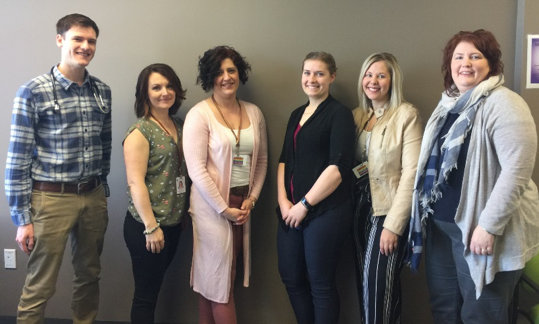
Embracing Research in Rural Dementia Care
Jennifer Hill is a Primary Health Care Facilitator based out of Weyburn for the Saskatchewan Health Authority and a community-based research partner with the RaDAR Team. She is also a private practitioner with ThornHill Counselling and is Vice-President of the South East Branch of the Saskatchewan Association of Social Workers.
By Jennifer Hill, BSW, RSWA wave of panic crashed over me in 2014, 6 weeks into a new job, when Dr. Debra Morgan and Dr. Julie Kosteniuk from the Canadian Centre for Health & Safety in Agriculture with the University of Saskatchewan presented former Sun Country Health Region with a research opportunity. I knew nothing about research and I knew nothing about Agriculture (spoiler alert – I still don’t!). They wanted to learn about Dementia services in rural Saskatchewan. Research really didn’t seem like something I would be interested in thinking that the best way to help people would be direct practice. Despite my hesitancy, I made my way outside my comfort zone.
Once we laid out the current state of our services to see what was working great, where the gaps in services were and had a concrete idea of how things were being done, the research team then helped us to implement an effective, sustainable model of dementia care in rural communities that integrated inter-professional care, specialist-to-provider support, and decision support tools.
By 2015, Kipling was starting to look at the framework and they did the heavy lifting to make the PC-DATA (Primary Care Dementia Assessment and Treatment Algorithm) tool functional for their team in the EMR (Electronic Medical Record). This, for former Sun Country, is where RaDAR was really formed.
RaDAR (Rural Dementia Action Research) is an acronym that we use but what it means is being able to provide memory assessment and ongoing management for patients in their home community. I’ve had the opportunity, and some days the challenge, of supporting teams in Weyburn, Radville and Bengough to implement these tools and services. The PC -Data tool provides the framework to a Physician/Nurse Practitioner, Home Care Nurse, Social Worker, Occupational Therapist, Physical Therapist and FirstLink Coordinator with the Alzheimer Society. Our patient and their family are seen by all of the professionals individually. At the end of their 3 hour appointment, they meet with the entire group for a case conference where recommendations are reviewed and then provided to the patients and their family. As teams begin to provide follow up care, we are currently developing a standard process to implement.
By 2019, RaDAR has been constantly modified, improved, and was expanded from Kipling to Weyburn, Bengough, Radville and Carlyle because when you have something truly wonderful, it only makes sense to share it.
There are 3 key elements of RaDAR that make it incredible:
Collaboration & Team Based Care – All of the above mentioned team members have come together, shared their scope, expertise, and learned from each other. There’s an aspect of the informal communication of having those people in a room together that also builds the relationships and social capital that propels success and quality care for all patients, even outside of our clinics. The team has been involved in another research project about team based care led by Dr. Amanda Froehlich Chow.
Building Capacity of the Team: The RaDAR teams are able to constantly be learning new skills thanks to the support of the U of S Team. Professionals have had sessions about Determining Capacity, Pharmacological Management, and Driving Assessments; just to mention a few. The more our team can do for the patient in their home community, the better the patient experience.
Patient Centred Care: The patient and their family are supported from the moment they are identified, throughout the clinic and for ongoing management. Dr. Melanie Bayly leads an additional research project that gathers qualitative evaluation data from the patients so we know that patients are having a positive experience in a difficult situation. Patients report feeling respected, heard and not feeling rushed. This is the exact care and support I would want for myself, so I am proud to be able to offer it to others.
There’s a constantly recurring theme in my career – you don’t know what you don’t know. Research didn’t seem like an interest to me, but it has turned out to be one of the things in my career I am most honored to be a part of because of how many professionals, patients and families I have been able to help.
I encourage anyone with additional interest to check out the website: https://cchsa-ccssma.usask.ca/ruraldementiacare/
This article was written for the Saskatchewan Association of Social Workers newsletter.


